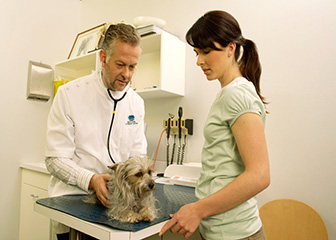Finding a Qualified Resume Writer for a...
|
| Resume Writers... | Thumbnail Review... |
 |
www.greatresumesfast.com | Pricey, yes. But for good reason. Writing is "top shelf" from a team of HR Execs, Hiring Managers and former Recruiters--read the bios of the writers on the company's website. Expect an hour-long consultative phone session with your writer. An interview is guaranteed. Zero complaints on the Web, and the Better Business Bureau gives them an A+ rating. |
|
www.resumewriters.com | Reasonable pricing, standout writing, and an interview guarantee from the largest network of resume writers on the Internet (representing more than 5 dozen career fields and industries). These are nationally-certified writers (Certified Professional Resume Writers), and you'll consult one-on-one with your writer. The Better Business Bureau gives them an A+ rating. |
Considering a Career Move into Veterinary Medicine?
If you're considering a move into Veterinary Medicine from either a closely related field or from a totally unrelated profession, you'll be looking for a transitional resume -- and a talented resume writer to handle the assignment. Transitional resumes are some of the most difficult resume projects as they require a writer knowledgeable in at least two professions -- and the ability to identify transferable skills from one to the other.
Before you hand off that resume assignment, make sure you know enough about the job of a Veterinarian to... a) really want it, and b) be able to step up to the plate. Here's a quick overview (more information at Wikipedia - Veterinary Physician):
 |
What You'll Do: Vets can specialize in certain areas such as companion animals, food animals, or research. While the job can vary depending on your specialization, vets typically: treat wounds, give shots and other medications, perform surgeries, do lab tests to identify illnesses, use advanced medical technologies to diagnose and treat, educate owners and the public about animal care, put critically injured or chronically ill animals to sleep, and do research. Most vets work full-time at an animal clinic or hospital or run their own. You might also seek employment at a research university or the federal government. Your work setting can vary from an office environment to a laboratory or outside location depending on the task at hand. The job can be very exhausting and dangerous since you deal with infected or injured animals that are scared and defensive on a daily basis. However, your focus may be on research instead of treatment so such hazards may not apply to you. |
 |
Education and Training: To become a veterinarian, you need to have a Doctor of Veterinary Medicine degree. This professional degree program generally lasts four years. Most vet students already have a bachelor's degree in a health-related concentration and some relevant work experience. Popular courses for those interested in attending vet school include: chemistry, biology, zoology, microbiology, anatomy and physiology. Once admitted to a vet program, you must complete additional coursework in the animal sciences, lab training, and a clinical experience portion. The clinical rotation work is usually done during the last year of the vet program. Business and management courses are also mandatory at certain schools. Once the program is completed, you must pass a state exam to become licensed for practice. Additional training and certification will put you ahead of the competition when job searching. |
 |
The Future: The Veterinarian profession is expected to grow at about 36% through 2020. |
 |
The Pay: Annual salaries for Veterinarians in the U.S. range from $49,900 to $145,200, with the average median annual wage hitting $84,400 in 2012 as per the U.S. Bureau of Labor Statistics. |
Still interested in pursuing a position in Veterinary Medicine? Got the qualifications? Great. The next step is to prepare for a consultative telephone interview with your resume writer. Treat the coming job search like the business it is, and you'll do fine.
Best of luck,
David Alan Carter, OccupationalResumes.com

Tag or bookmark under:
Veterinarian Resume | Veterinary Occupation | Resume Writing Services for Veterinary Physicians
_____
NOTE: This website
is monetized through the use of Affiliate Programs with the online providers we review. Read our Disclosure Statement for more information on our Affiliate
Relationships.
|


 Back To
Top
Back To
Top Facebook
Facebook Twitter
Twitter